

Commentary Select
Commentary Select




New International Commentary on the New Testament (NICNT): Ephesians (Cohick)

New International Commentary on the New Testament (NICNT): Ephesians (Cohick)
The letter to the Ephesians provokes an array of interpretive questions regarding authorship, audience, date, occasion, purpose of writing, and the nature of its moral instruction—including its words addressed to slaves and masters. Interacting critically in an arena of intense debate, Lynn Cohick provides an exegetically astute analysis of the six chapters of Ephesians, offering an insightful account of the letter’s theology and soteriology as she attends to its expansive prose and lofty vision of God’s redemption.
Cohick analyzes everything from the letter’s description of the church and its appeals for discipleship to the complex relationship between Jews and gentiles within the text and in the broader cultural context. Her extensive knowledge of the social realities of women and families in the ancient world is also evident throughout. Historically sensitive and theologically rich, Cohick’s commentary will be an abundant resource for a new generation of scholars, pastors, and lay leaders.
Reviews
“Cohick’s scholarship is exceptionally up-to-date, and her text is highly readable and relevant for commentary users interested in the message of Ephesians. She fairly engages other scholars and attends to the grammar and the ancient context, highlighting also ancient social realities that many commentators miss.” — Craig S. Keener, Asbury Theological Seminary
“With an emphasis on cultural backgrounds, New Testament scholar Lynn Cohick offers a fresh exposition of Ephesians that is historically grounded and theologically astute. This commentary should be on the shelf of every pastor, teacher, and student who wants to know not only what Ephesians means, but how its message can be applied to life today.” — Karen H. Jobes, Wheaton College
“Lynn Cohick’s commentary on Ephesians, which clearly and compellingly explicates that which comprises and animates the letter, may be aptly described as a gift to both the church and the academy. Like the vast majority of her interpretive predecessors, Cohick envisions Ephesians as an authentic Pauline letter written by the apostle Paul from Roman captivity in the early 60s CE to gentile Christ followers in the city of Ephesus. Following an expansive, substantive introduction, Cohick patiently and skillfully attends to the literary beauty, theological profundity, and pastoral concerns that pervade Paul’s dearly beloved letter to the Ephesians.” — Todd D. Still, George W. Truett Theological Seminary, Baylor University
Lynn H. Cohick is provost, dean of academic affairs, and professor of New Testament at Northern Seminary. Her other books include Christian Women in the Patristic World, Women in the World of the Earliest Christians, and a commentary on Philippians in the Story of God Bible Commentary series.
New International Commentary on the New Testament (NICNT): Paul's Letter to the Philippians
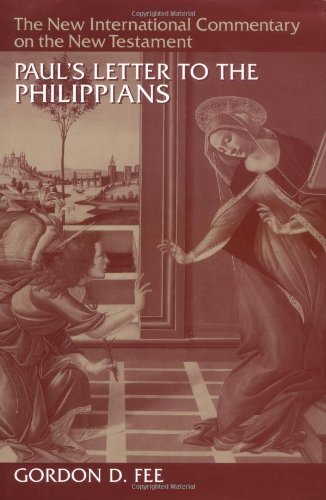
New International Commentary on the New Testament (NICNT): Paul's Letter to the Philippians
About the New International Commentary on the New Testament
"Faithful criticism" characterizes volumes in The New International Commentary on the New Testament (NICNT), and is widely recognized by pastors, students, and scholars alike for its attention to the text of Scripture, its currency with contemporary scholarship, and its service to the global church.
The interpretive work reflected in these commentaries is based on careful study of the Greek text, but commentary readers need not be practiced in the biblical languages to benefit from them. In the same way, NICNT volumes reflect serious work in technical areas — such as linguistics, textual criticism, and historical concerns — but the commentary itself focuses on understanding the text rather than navigating scholarly debates. Readers can turn to the footnotes and excursuses for more specialized interaction with the Greek text and engagement with critical issues and literature.
New International Commentary on the New Testament (NICNT): The Book of Acts
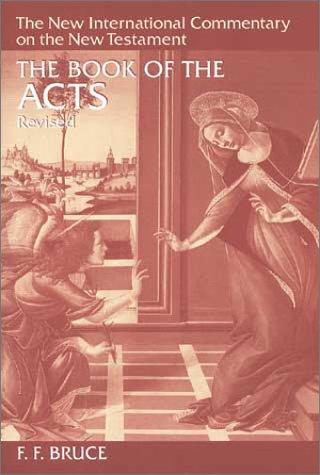
New International Commentary on the New Testament (NICNT): The Book of Acts
About the New International Commentary on the New Testament
"Faithful criticism" characterizes volumes in The New International Commentary on the New Testament (NICNT), and is widely recognized by pastors, students, and scholars alike for its attention to the text of Scripture, its currency with contemporary scholarship, and its service to the global church.
The interpretive work reflected in these commentaries is based on careful study of the Greek text, but commentary readers need not be practiced in the biblical languages to benefit from them. In the same way, NICNT volumes reflect serious work in technical areas — such as linguistics, textual criticism, and historical concerns — but the commentary itself focuses on understanding the text rather than navigating scholarly debates. Readers can turn to the footnotes and excursuses for more specialized interaction with the Greek text and engagement with critical issues and literature.
New International Commentary on the New Testament (NICNT): The Book of Revelation
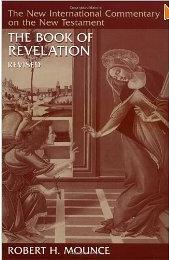
New International Commentary on the New Testament (NICNT): The Book of Revelation
About the New International Commentary on the New Testament
"Faithful criticism" characterizes volumes in The New International Commentary on the New Testament (NICNT), and is widely recognized by pastors, students, and scholars alike for its attention to the text of Scripture, its currency with contemporary scholarship, and its service to the global church.
The interpretive work reflected in these commentaries is based on careful study of the Greek text, but commentary readers need not be practiced in the biblical languages to benefit from them. In the same way, NICNT volumes reflect serious work in technical areas — such as linguistics, textual criticism, and historical concerns — but the commentary itself focuses on understanding the text rather than navigating scholarly debates. Readers can turn to the footnotes and excursuses for more specialized interaction with the Greek text and engagement with critical issues and literature.
New International Commentary on the New Testament (NICNT): The Epistle to the Galatians
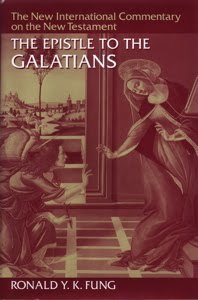
New International Commentary on the New Testament (NICNT): The Epistle to the Galatians
About the New International Commentary on the New Testament
"Faithful criticism" characterizes volumes in The New International Commentary on the New Testament (NICNT), and is widely recognized by pastors, students, and scholars alike for its attention to the text of Scripture, its currency with contemporary scholarship, and its service to the global church.
The interpretive work reflected in these commentaries is based on careful study of the Greek text, but commentary readers need not be practiced in the biblical languages to benefit from them. In the same way, NICNT volumes reflect serious work in technical areas — such as linguistics, textual criticism, and historical concerns — but the commentary itself focuses on understanding the text rather than navigating scholarly debates. Readers can turn to the footnotes and excursuses for more specialized interaction with the Greek text and engagement with critical issues and literature.
New International Commentary on the New Testament (NICNT): The Epistle to the Hebrews
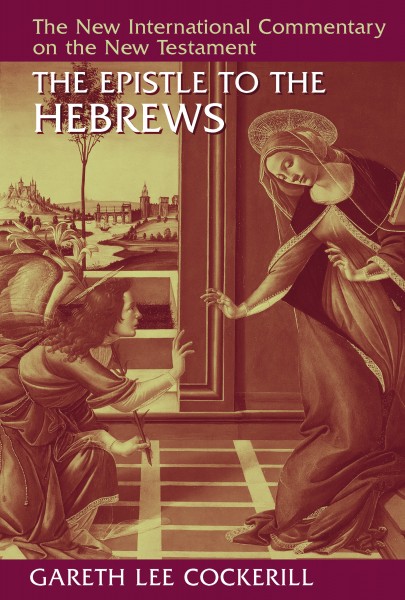
New International Commentary on the New Testament (NICNT): The Epistle to the Hebrews
About the New International Commentary on the New Testament
"Faithful criticism" characterizes volumes in The New International Commentary on the New Testament (NICNT), and is widely recognized by pastors, students, and scholars alike for its attention to the text of Scripture, its currency with contemporary scholarship, and its service to the global church.
The interpretive work reflected in these commentaries is based on careful study of the Greek text, but commentary readers need not be practiced in the biblical languages to benefit from them. In the same way, NICNT volumes reflect serious work in technical areas — such as linguistics, textual criticism, and historical concerns — but the commentary itself focuses on understanding the text rather than navigating scholarly debates. Readers can turn to the footnotes and excursuses for more specialized interaction with the Greek text and engagement with critical issues and literature.
New International Commentary on the New Testament (NICNT): The Epistle to the Hebrews (Bruce)

New International Commentary on the New Testament (NICNT): The Epistle to the Hebrews (Bruce)
For many readers the Epistle to the Hebrews is among the most difficult books of the New Testament. Understanding its message calls for a great familiarity with its Old Testament background and a good knowledge of first-century biblical exegesis. This volume on Hebrews covers both of those fronts. When first published in 1964, Bruce's Hebrews received critical acclaim, and over the years it has become a classic work of evangelical biblical scholarship. Just before his death in 1990, Bruce completed a full revision of the text, incorporating twenty-five years of further study. Every reader of Hebrews -- whether student or scholar, minister or layperson -- will benefit from the careful exegesis and pastoral wisdom distilled in this volume.
About the New International Commentary on the New Testament
"Faithful criticism" characterizes volumes in The New International Commentary on the New Testament (NICNT), and is widely recognized by pastors, students, and scholars alike for its attention to the text of Scripture, its currency with contemporary scholarship, and its service to the global church.
The interpretive work reflected in these commentaries is based on careful study of the Greek text, but commentary readers need not be practiced in the biblical languages to benefit from them. In the same way, NICNT volumes reflect serious work in technical areas — such as linguistics, textual criticism, and historical concerns — but the commentary itself focuses on understanding the text rather than navigating scholarly debates. Readers can turn to the footnotes and excursuses for more specialized interaction with the Greek text and engagement with critical issues and literature.
New International Commentary on the New Testament (NICNT): The Epistle to the Romans, 1st Ed.

New International Commentary on the New Testament (NICNT): The Epistle to the Romans, 1st Ed.
Paul's letter to the Romans has been called "the quintessence and perfection of saving doctrine." Perhaps the most challenging and thoroughly doctrinal book of the entire New Testament, Romans deals with many issues that are basic to Christian theology and practice. In this volume respected New Testament scholar Douglas J. Moo provides a superb study of Paul's letter to the Roman Christians and restates the enduring message of Romans for Christians today.
Based on the English text but bringing into the discussion the underlying Greek at every point, this commentary focuses both on theological meaning and on contemporary significance. Moo contributes to the continuing debate regarding Paul's teaching on such issues as Jewish law and the relationship between Jews and Gentiles in the people of God. He also critically interacts with "the new perspective on Paul," highlights Romans's emphasis on "practical divinity," and traces the theme of gospel throughout the epistle.
Twelve years in the making and a steady seller during its first decade in print, Moo's Epistle to the Romans will continue to serve as a standard exposition of Romans.
About the New International Commentary on the New Testament
"Faithful criticism" characterizes volumes in The New International Commentary on the New Testament (NICNT), and is widely recognized by pastors, students, and scholars alike for its attention to the text of Scripture, its currency with contemporary scholarship, and its service to the global church.
The interpretive work reflected in these commentaries is based on careful study of the Greek text, but commentary readers need not be practiced in the biblical languages to benefit from them. In the same way, NICNT volumes reflect serious work in technical areas — such as linguistics, textual criticism, and historical concerns — but the commentary itself focuses on understanding the text rather than navigating scholarly debates. Readers can turn to the footnotes and excursuses for more specialized interaction with the Greek text and engagement with critical issues and literature.
New International Commentary on the New Testament (NICNT): The Epistles of John

New International Commentary on the New Testament (NICNT): The Epistles of John
The three Epistles of John, according to I. Howard Marshall, are concerned with the fundamentals of Christian belief and life - faith and love. The reader who grasps the message of these short but essential letters will have a sound basis in Christian doctrine. This group of Epistles, says Marshall, is also a good starting point for the study of the Gospel of John. This commentary, then, was written so that students of the Bible might not only master the content of John's Epistles but also better understand Johannine theology as a whole.
The volume includes an "invitation" to general readers and an "introduction" addressed to students and specialists. Another unique feature is a rearrangement of the traditional order of the three letters: 2 John and 3 John are studied before 1 John. This structure assures that the two shorter letters are not relegated to the position of appendices but are treated as important documents of early Christianity in their own right.
About the New International Commentary on the New Testament
"Faithful criticism" characterizes volumes in The New International Commentary on the New Testament (NICNT), and is widely recognized by pastors, students, and scholars alike for its attention to the text of Scripture, its currency with contemporary scholarship, and its service to the global church.
The interpretive work reflected in these commentaries is based on careful study of the Greek text, but commentary readers need not be practiced in the biblical languages to benefit from them. In the same way, NICNT volumes reflect serious work in technical areas — such as linguistics, textual criticism, and historical concerns — but the commentary itself focuses on understanding the text rather than navigating scholarly debates. Readers can turn to the footnotes and excursuses for more specialized interaction with the Greek text and engagement with critical issues and literature.
New International Commentary on the New Testament (NICNT): The Epistles to the Colossians, to Philemon, and to the Ephesians

New International Commentary on the New Testament (NICNT): The Epistles to the Colossians, to Philemon, and to the Ephesians
Comprehensive and accessible, the New International Commentary on the New Testament is one of the most highly regarded resources of current scholarship. Prepared by world-renowned authorities, it reflects exacting study of the original Greek and offers careful exegesis with preachers and teachers concerns in mind. Critical comments are footnoted; grammatical, textual, and historical details are appended.
New International Commentary on the New Testament (NICNT): The First and Second Letters to the Thessalonians
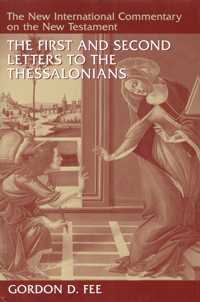
New International Commentary on the New Testament (NICNT): The First and Second Letters to the Thessalonians
In this commentary Gordon Fee aims first and foremost to offer a fresh exposition of the text of 1 and 2 Thessalonians. He shows the reader what is in the biblical text, what the text meant in the first century, and what it means now. Fee reveals the logic of each argument or narrative before moving on to the details of each verse, and he concludes each section with a theological-practical reflection on the meaning of the text today. Among other things, Fee explores the occasion for writing for each epistle, restoring 2 Thessalonians to the place it deserves as a full companion to the first letter, rather than merely a tagalong to 1 Thessalonians.
About the New International Commentary on the New Testament
"Faithful criticism" characterizes volumes in The New International Commentary on the New Testament (NICNT), and is widely recognized by pastors, students, and scholars alike for its attention to the text of Scripture, its currency with contemporary scholarship, and its service to the global church.
The interpretive work reflected in these commentaries is based on careful study of the Greek text, but commentary readers need not be practiced in the biblical languages to benefit from them. In the same way, NICNT volumes reflect serious work in technical areas — such as linguistics, textual criticism, and historical concerns — but the commentary itself focuses on understanding the text rather than navigating scholarly debates. Readers can turn to the footnotes and excursuses for more specialized interaction with the Greek text and engagement with critical issues and literature.
New International Commentary on the New Testament (NICNT): The First Epistle of Peter
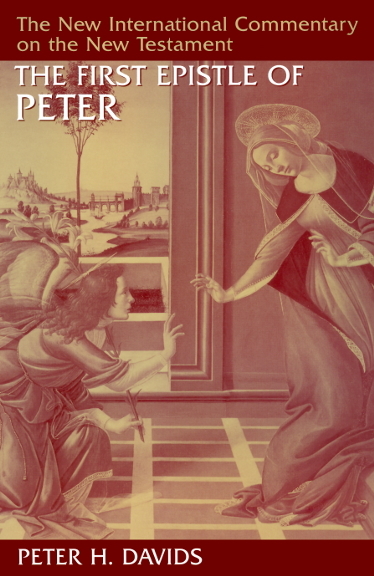
New International Commentary on the New Testament (NICNT): The First Epistle of Peter
About the New International Commentary on the New Testament
"Faithful criticism" characterizes volumes in The New International Commentary on the New Testament (NICNT), and is widely recognized by pastors, students, and scholars alike for its attention to the text of Scripture, its currency with contemporary scholarship, and its service to the global church.
The interpretive work reflected in these commentaries is based on careful study of the Greek text, but commentary readers need not be practiced in the biblical languages to benefit from them. In the same way, NICNT volumes reflect serious work in technical areas — such as linguistics, textual criticism, and historical concerns — but the commentary itself focuses on understanding the text rather than navigating scholarly debates. Readers can turn to the footnotes and excursuses for more specialized interaction with the Greek text and engagement with critical issues and literature.
New International Commentary on the New Testament (NICNT): The First Epistle to the Corinthians, 1st Ed.
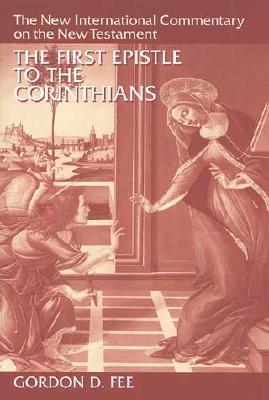
New International Commentary on the New Testament (NICNT): The First Epistle to the Corinthians, 1st Ed.
About the New International Commentary on the New Testament
"Faithful criticism" characterizes volumes in The New International Commentary on the New Testament (NICNT), and is widely recognized by pastors, students, and scholars alike for its attention to the text of Scripture, its currency with contemporary scholarship, and its service to the global church.
The interpretive work reflected in these commentaries is based on careful study of the Greek text, but commentary readers need not be practiced in the biblical languages to benefit from them. In the same way, NICNT volumes reflect serious work in technical areas — such as linguistics, textual criticism, and historical concerns — but the commentary itself focuses on understanding the text rather than navigating scholarly debates. Readers can turn to the footnotes and excursuses for more specialized interaction with the Greek text and engagement with critical issues and literature.
New International Commentary on the New Testament (NICNT): The First Epistle to the Corinthians, Revised

New International Commentary on the New Testament (NICNT): The First Epistle to the Corinthians, Revised
This landmark commentary, originally published in 1987, has been lauded as the best study available of Paul's theologically rich first letter to the Corinthians. Writing primarily for pastors, teachers, and students, Gordon Fee offers a readable exposition of 1 Corinthians that clearly describes the meaning of Paul's ideas and their larger theological relevance.
Fee's revised edition is based on the improved, updated (2011) edition of the NIV, and it takes into account the considerable scholarship on 1 Corinthians over the past twenty-five years. Fee has also eliminated "chapter and verse" language — totally foreign to Paul's first-century letter — relegating the necessary numbers for "finding things" to parentheses.
About the New International Commentary on the New Testament
"Faithful criticism" characterizes volumes in The New International Commentary on the New Testament (NICNT), and is widely recognized by pastors, students, and scholars alike for its attention to the text of Scripture, its currency with contemporary scholarship, and its service to the global church.
The interpretive work reflected in these commentaries is based on careful study of the Greek text, but commentary readers need not be practiced in the biblical languages to benefit from them. In the same way, NICNT volumes reflect serious work in technical areas — such as linguistics, textual criticism, and historical concerns — but the commentary itself focuses on understanding the text rather than navigating scholarly debates. Readers can turn to the footnotes and excursuses for more specialized interaction with the Greek text and engagement with critical issues and literature.
New International Commentary on the New Testament (NICNT): The Gospel of John (Michaels)

New International Commentary on the New Testament (NICNT): The Gospel of John (Michaels)
In this detailed, elegantly written commentary J. Ramsey Michaels gives primary attention to the Gospel of John in its present form rather than to the sources or traditions behind it. Michaels examines both the Gospel's literary character and its theological significance for the Christian community in its own time and through the ages. This landmark commentary -- seventeen years in the making, reflecting fifty years of classroom teaching, and packed with fresh insights -- will prove highly useful to scholars, students, and, especially, pastors.
"Here is a substantial, truly original exposition of extraordinary insight and helpfulness to pastor and scholar alike, which should have a considerable life span after both the author and editor have gone to their eternal reward."
-- Gordon D. Fee (from editor's preface)
About the New International Commentary on the New Testament
"Faithful criticism" characterizes volumes in The New International Commentary on the New Testament (NICNT), and is widely recognized by pastors, students, and scholars alike for its attention to the text of Scripture, its currency with contemporary scholarship, and its service to the global church.
The interpretive work reflected in these commentaries is based on careful study of the Greek text, but commentary readers need not be practiced in the biblical languages to benefit from them. In the same way, NICNT volumes reflect serious work in technical areas — such as linguistics, textual criticism, and historical concerns — but the commentary itself focuses on understanding the text rather than navigating scholarly debates. Readers can turn to the footnotes and excursuses for more specialized interaction with the Greek text and engagement with critical issues and literature.
New International Commentary on the New Testament (NICNT): The Gospel of John (Morris)
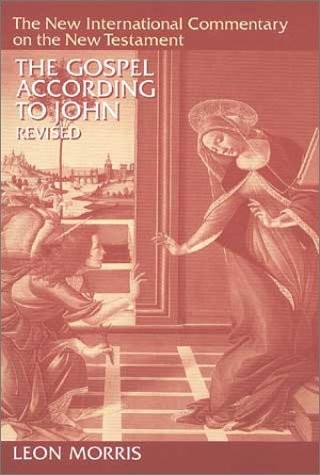
New International Commentary on the New Testament (NICNT): The Gospel of John (Morris)
Morris states in his introduction that John “…is a simple Gospel. The humblest believer can read it and understand it and profit from it”, but notes that “…there are unplumbed depths in the limpid clarity of this writing. What at first appears obvious is presently seen to pose problems. Most students would agree with Hoskyns that years of close study of this Gospel do not leave one with a feeling of having mastered it, but rather with the conviction that it is still 'strange, restless, and unfamiliar.'"
About the New International Commentary on the New Testament
"Faithful criticism" characterizes volumes in The New International Commentary on the New Testament (NICNT), and is widely recognized by pastors, students, and scholars alike for its attention to the text of Scripture, its currency with contemporary scholarship, and its service to the global church.
The interpretive work reflected in these commentaries is based on careful study of the Greek text, but commentary readers need not be practiced in the biblical languages to benefit from them. In the same way, NICNT volumes reflect serious work in technical areas — such as linguistics, textual criticism, and historical concerns — but the commentary itself focuses on understanding the text rather than navigating scholarly debates. Readers can turn to the footnotes and excursuses for more specialized interaction with the Greek text and engagement with critical issues and literature.
New International Commentary on the New Testament (NICNT): The Gospel of Luke

New International Commentary on the New Testament (NICNT): The Gospel of Luke
This highly original commentary, part of the New International Commentary, is unique for the way it combines concerns with first-century culture in the Roman world with understanding the text of Luke as a holistic, historical narrative.
About the New International Commentary on the New Testament
"Faithful criticism" characterizes volumes in The New International Commentary on the New Testament (NICNT), and is widely recognized by pastors, students, and scholars alike for its attention to the text of Scripture, its currency with contemporary scholarship, and its service to the global church.
The interpretive work reflected in these commentaries is based on careful study of the Greek text, but commentary readers need not be practiced in the biblical languages to benefit from them. In the same way, NICNT volumes reflect serious work in technical areas — such as linguistics, textual criticism, and historical concerns — but the commentary itself focuses on understanding the text rather than navigating scholarly debates. Readers can turn to the footnotes and excursuses for more specialized interaction with the Greek text and engagement with critical issues and literature.
New International Commentary on the New Testament (NICNT): The Gospel of Mark
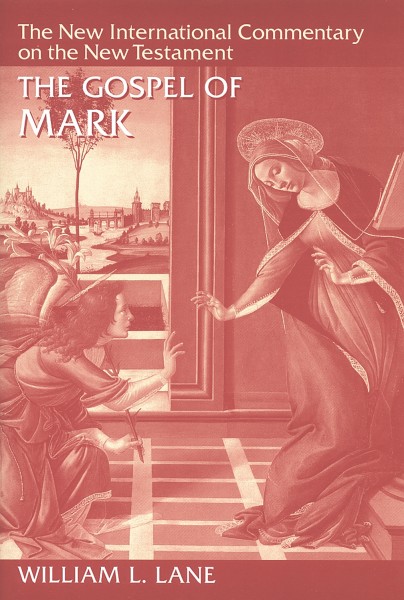
New International Commentary on the New Testament (NICNT): The Gospel of Mark
This widely praised commentary by William Lane shows Mark to be a theologian whose primary aim was to strengthen the people of God in a time of fiery persecution by Nero. Using redaction criticism as a hermeneutical approach for understanding the text and the intention of the evangelist, Lane considers the Gospel of Mark as a total literary work and describes Mark's creative role in shaping the Gospel tradition and in exercising a conscious theological purpose.
Both indicating how the text was heard by Mark's contemporaries and studying Mark within the frame of reference of modern Gospel research, Lane's thoroughgoing work is at once useful to scholars and intelligible to nonspecialists.
About the New International Commentary on the New Testament
"Faithful criticism" characterizes volumes in The New International Commentary on the New Testament (NICNT), and is widely recognized by pastors, students, and scholars alike for its attention to the text of Scripture, its currency with contemporary scholarship, and its service to the global church.
The interpretive work reflected in these commentaries is based on careful study of the Greek text, but commentary readers need not be practiced in the biblical languages to benefit from them. In the same way, NICNT volumes reflect serious work in technical areas — such as linguistics, textual criticism, and historical concerns — but the commentary itself focuses on understanding the text rather than navigating scholarly debates. Readers can turn to the footnotes and excursuses for more specialized interaction with the Greek text and engagement with critical issues and literature.
New International Commentary on the New Testament (NICNT): The Gospel of Matthew

New International Commentary on the New Testament (NICNT): The Gospel of Matthew
Rather than being a "commentary on commentaries," The Gospel of Matthew is concerned throughout with what Matthew himself meant to convey about Jesus and how he set about doing so within the cultural and historical context of first-century Palestine. France frequently draws attention to the distinctive nature of the province of Galilee and the social dynamics involved when a Galilean prophet presents himself in Jerusalem as the Messiah.
The English translation at the beginning of each section is France's own, designed to provide the basis for the commentary. This adept translation uses contemporary idioms and, where necessary, gives priority to clarity over literary elegance.
Amid the wide array of Matthew commentaries available today, France's world-class stature, his clear focus on Matthew and Jesus, his careful methodology, and his user-friendly style promise to make this volume an enduring standard for years to come. Comprehensive and accessible, the New International Commentary on the New Testament is one of the most highly regarded resources of current scholarship. Prepared by world-renowned authorities, it reflects exacting study of the original Greek and offers careful exegesis with preachers and teachers concerns in mind. Critical comments are footnoted; grammatical, textual, and historical details are appended.
About the New International Commentary on the New Testament
"Faithful criticism" characterizes volumes in The New International Commentary on the New Testament (NICNT), and is widely recognized by pastors, students, and scholars alike for its attention to the text of Scripture, its currency with contemporary scholarship, and its service to the global church.
The interpretive work reflected in these commentaries is based on careful study of the Greek text, but commentary readers need not be practiced in the biblical languages to benefit from them. In the same way, NICNT volumes reflect serious work in technical areas — such as linguistics, textual criticism, and historical concerns — but the commentary itself focuses on understanding the text rather than navigating scholarly debates. Readers can turn to the footnotes and excursuses for more specialized interaction with the Greek text and engagement with critical issues and literature.
New International Commentary on the New Testament (NICNT): The Letter of James

New International Commentary on the New Testament (NICNT): The Letter of James
Pastors and scholars have often found the letter of James particularly vexing both to interpret and to apply. Scot McKnight's commentary expounds James both in its own context and in the context of ancient Judaism, the Greco-Roman world, and the emerging Christian faith. Though interacting with the best available scholarly work on James, McKnight first connects deeply with the text of the letter itself, striving to interpret James's teaching rigorously in light of what he says elsewhere in his letter rather than smothering the epistle in extrinsic debates and theories. Shaped from beginning to end for pastors, preachers, and teachers, this accessible commentary -- full of insight, good sense, and wit -- will shed fresh light for those who want to explain James and its significance to their congregations and classes.
About the New International Commentary on the New Testament
"Faithful criticism" characterizes volumes in The New International Commentary on the New Testament (NICNT), and is widely recognized by pastors, students, and scholars alike for its attention to the text of Scripture, its currency with contemporary scholarship, and its service to the global church.
The interpretive work reflected in these commentaries is based on careful study of the Greek text, but commentary readers need not be practiced in the biblical languages to benefit from them. In the same way, NICNT volumes reflect serious work in technical areas — such as linguistics, textual criticism, and historical concerns — but the commentary itself focuses on understanding the text rather than navigating scholarly debates. Readers can turn to the footnotes and excursuses for more specialized interaction with the Greek text and engagement with critical issues and literature.
New International Commentary on the New Testament (NICNT): The Letter of James (Adamson)
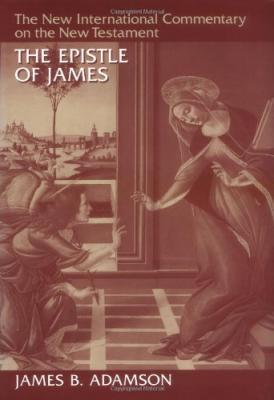
New International Commentary on the New Testament (NICNT): The Letter of James (Adamson)
About the New International Commentary on the New Testament
"Faithful criticism" characterizes volumes in The New International Commentary on the New Testament (NICNT), and is widely recognized by pastors, students, and scholars alike for its attention to the text of Scripture, its currency with contemporary scholarship, and its service to the global church.
The interpretive work reflected in these commentaries is based on careful study of the Greek text, but commentary readers need not be practiced in the biblical languages to benefit from them. In the same way, NICNT volumes reflect serious work in technical areas — such as linguistics, textual criticism, and historical concerns — but the commentary itself focuses on understanding the text rather than navigating scholarly debates. Readers can turn to the footnotes and excursuses for more specialized interaction with the Greek text and engagement with critical issues and literature.
New International Commentary on the New Testament (NICNT): The Letter to Philemon
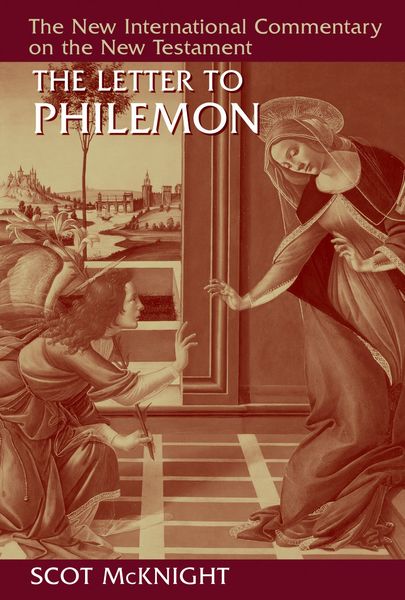
New International Commentary on the New Testament (NICNT): The Letter to Philemon
In this commentary Scot McKnight carefully analyzes the text of Philemon and brings its entanglement with ancient Roman slavery into conversation with modern slavery. Too often, McKnight says, studies of this short letter gloss over the issue of slavery. Christians who want to read Philemon faithfully must grapple with moral questions, personal and institutional, that Paul himself does not raise. Pastors and scholars will find in McKnight’s commentary the insight they need to teach this controversial short book in meaningful new ways.
About the New International Commentary on the New Testament
"Faithful criticism" characterizes volumes in The New International Commentary on the New Testament (NICNT), and is widely recognized by pastors, students, and scholars alike for its attention to the text of Scripture, its currency with contemporary scholarship, and its service to the global church.
The interpretive work reflected in these commentaries is based on careful study of the Greek text, but commentary readers need not be practiced in the biblical languages to benefit from them. In the same way, NICNT volumes reflect serious work in technical areas — such as linguistics, textual criticism, and historical concerns — but the commentary itself focuses on understanding the text rather than navigating scholarly debates. Readers can turn to the footnotes and excursuses for more specialized interaction with the Greek text and engagement with critical issues and literature.
“Scot McKnight has given us a bold study of this controversial little letter. He stares unflinchingly into the realities of slavery. . . . Working from conservative positions on critical issues, McKnight sees the letter to Philemon as demanding that the church today work in society to bring reconciliation and liberation to a world in need of both.” — Jerry L. Sumney, Lexington Theological Seminary
“With thoughtful attention to the painful realities of Roman slavery, McKnight invites churches to approach this ‘deeply disturbing letter’ as an invitation to become spaces of reconciliation, communities that subvert slavery ‘by naming it, by fighting against it, and by embodying a new way of life.’ ” — Jennifer Glancy, author of Slavery in Early Christianity
“A lucid and illuminating verse-by-verse analysis of Paul’s letter to Philemon. Scot McKnight soberly tackles the topics of Roman slavery, reconciliation, and Paul’s vision for churches to be dominated not by power relationships but by sibling-like relationships rooted in the new creation. McKnight makes this small letter stand tall among the writings of the Pauline corpus. A sheer joy to read!” — Michael F. Bird, Ridley College, Melbourne
"This commentary is a helpful addition to scholarship on the shortest of Paul's letters. However, it is more than that. It allows readers to appreciate how this brief text might speak afresh to situations of oppression, powerlessness and modern slavery. Those probing insights make this a highly significant book." — Expository Times
New International Commentary on the New Testament (NICNT): The Letter to the Colossians
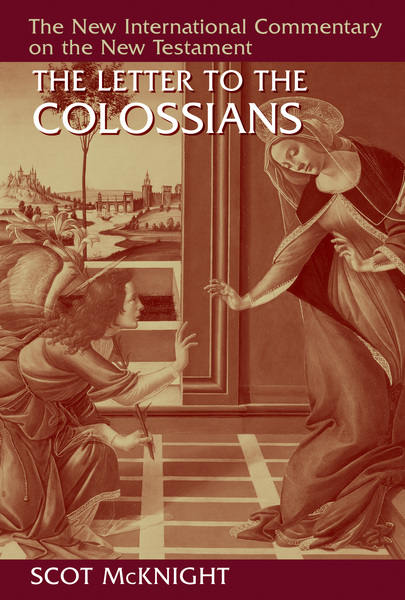
New International Commentary on the New Testament (NICNT): The Letter to the Colossians
About the New International Commentary on the New Testament
"Faithful criticism" characterizes volumes in The New International Commentary on the New Testament (NICNT), and is widely recognized by pastors, students, and scholars alike for its attention to the text of Scripture, its currency with contemporary scholarship, and its service to the global church.
The interpretive work reflected in these commentaries is based on careful study of the Greek text, but commentary readers need not be practiced in the biblical languages to benefit from them. In the same way, NICNT volumes reflect serious work in technical areas — such as linguistics, textual criticism, and historical concerns — but the commentary itself focuses on understanding the text rather than navigating scholarly debates. Readers can turn to the footnotes and excursuses for more specialized interaction with the Greek text and engagement with critical issues and literature.
“Scot McKnight’s commentary on Colossians offers everything one could want: a lively and readable exposition of the biblical text, with helpful observations on Greek grammar and translation; familiarity with primary sources that illumine the ancient context of this letter and the situation that evoked it; a wide-ranging acquaintance with issues in recent scholarship on Pauline theology; and sensitivity to the epistle’s theological claims and themes. Those committed to a careful study of this epistle will find McKnight a wise and judicious guide.” Marianne Meye Thompson — Fuller Theological Seminary
“McKnight’s conservative approach to Paul incorporates insights from a broad spectrum of ‘new approaches’ to the apostle and his theology. His years of teaching Colossians in Greek provide detailed grammar analysis in footnotes. Insisting that Paul is above all a missionary and pastor for whom the new regime of King Jesus challenges the dark powers of imperialism, McKnight’s commentary offers pastors and other readers a fresh vision of church communities as the embodiment of God’s new creation.” Pheme Perkins — Boston College
“This commentary by Scot McKnight provides a rare combination of readability, attention to linguistic details, and knowledge of contemporary scholarship on the letter to the Colossians. It is obviously the product of a career of reflection on this letter.” James W. Thompson — Abilene Christian University
New International Commentary on the New Testament (NICNT): The Letter to the Galatians (deSilva)
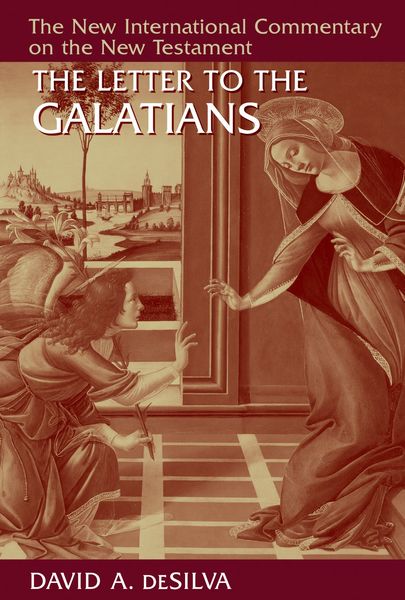
New International Commentary on the New Testament (NICNT): The Letter to the Galatians (deSilva)
In this replacement of Ronald Y. K. Fung’s 1988 New International Commentary volume, David deSilva ably rises to the challenge, providing a coherent account of Galatians as a piece of strategically crafted communication that addresses both the immediate pastoral challenges facing Paul’s converts in Galatia and the underlying questions that gave rise to them.
Paying careful attention to the history, philology, and theology of the letter, and interacting with a wealth of secondary literature on both Galatians and the rest of the Pauline corpus, deSilva’s exegetically sound commentary will serve as an essential resource for pastors and theological students.
About the New International Commentary on the New Testament
"Faithful criticism" characterizes volumes in The New International Commentary on the New Testament (NICNT), and is widely recognized by pastors, students, and scholars alike for its attention to the text of Scripture, its currency with contemporary scholarship, and its service to the global church.
The interpretive work reflected in these commentaries is based on careful study of the Greek text, but commentary readers need not be practiced in the biblical languages to benefit from them. In the same way, NICNT volumes reflect serious work in technical areas — such as linguistics, textual criticism, and historical concerns — but the commentary itself focuses on understanding the text rather than navigating scholarly debates. Readers can turn to the footnotes and excursuses for more specialized interaction with the Greek text and engagement with critical issues and literature.
Reviews
“A commentary packed with value for church people and scholars alike. David deSilva is one of the world’s best at bringing historical social context into fruitful dialogue with judicious interpretation of the text.” Peter Oakes — University of Manchester“This masterfully written study by David deSilva offers careful verse-by-verse exposition, a dozen timely and wise excursuses, thorough review of introductory questions, and balanced attention to both Hellenistic and Jewish backgrounds. It does not ignore theological questions but engages them to the full extent demanded by Paul’s language, interacting with (and often differing from) views of grace, faith, and law taken by Douglas Moo in his major Galatians commentary. Laying special emphasis on the Spirit and the new era of salvation history in which Paul writes, deSilva has produced a work that will long rank among the most significant English-language Galatians commentaries.” Robert W. Yarbrough — Covenant Theological Seminary
New International Commentary on the New Testament (NICNT): The Letter to the Romans, 2nd Edition
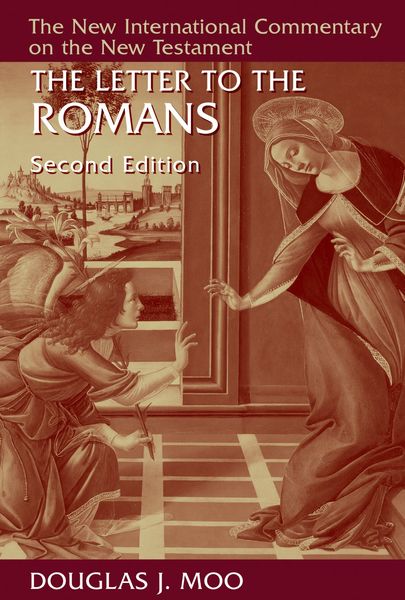
New International Commentary on the New Testament (NICNT): The Letter to the Romans, 2nd Edition
Exegetically astute and theologically minded, Moo interacts critically with the new perspective on Paul, highlights the emphasis in Romans on “practical divinity,” and traces the theme of the gospel throughout the letter. His Letter to the Romans in this second edition will inform and enlighten a new generation of serious Bible readers.
About the New International Commentary on the New Testament
"Faithful criticism" characterizes volumes in The New International Commentary on the New Testament (NICNT), and is widely recognized by pastors, students, and scholars alike for its attention to the text of Scripture, its currency with contemporary scholarship, and its service to the global church.
The interpretive work reflected in these commentaries is based on careful study of the Greek text, but commentary readers need not be practiced in the biblical languages to benefit from them. In the same way, NICNT volumes reflect serious work in technical areas — such as linguistics, textual criticism, and historical concerns — but the commentary itself focuses on understanding the text rather than navigating scholarly debates. Readers can turn to the footnotes and excursuses for more specialized interaction with the Greek text and engagement with critical issues and literature.
New International Commentary on the New Testament (NICNT): The Letters to Timothy and Titus

New International Commentary on the New Testament (NICNT): The Letters to Timothy and Titus
The most accessible, most broadly pitched full-length commentary on Timothy and Titus, this NICNT volume explores Paul's three letters to Timothy and Titus within their historical, religious, and cultural settings.
In his introduction, Towner sets out the rationale for his historical approach, questions certain assumptions of recent critical scholarship, and establishes the uniqueness and individuality of each letter. Significantly, Towner's work displays unprecedented interaction with four recent major commentaries on these Pauline letters. Centered on an outstanding translation of the Greek text and including thorough footnotes, bibliographical citations, and indexes, Towner's commentary on Timothy and Titus is sure to become a standard reference for busy pastors, students, and scholars.
About the New International Commentary on the New Testament
"Faithful criticism" characterizes volumes in The New International Commentary on the New Testament (NICNT), and is widely recognized by pastors, students, and scholars alike for its attention to the text of Scripture, its currency with contemporary scholarship, and its service to the global church.
The interpretive work reflected in these commentaries is based on careful study of the Greek text, but commentary readers need not be practiced in the biblical languages to benefit from them. In the same way, NICNT volumes reflect serious work in technical areas — such as linguistics, textual criticism, and historical concerns — but the commentary itself focuses on understanding the text rather than navigating scholarly debates. Readers can turn to the footnotes and excursuses for more specialized interaction with the Greek text and engagement with critical issues and literature.
New International Commentary on the New Testament (NICNT): The Second Epistle to the Corinthians

New International Commentary on the New Testament (NICNT): The Second Epistle to the Corinthians
About the New International Commentary on the New Testament
"Faithful criticism" characterizes volumes in The New International Commentary on the New Testament (NICNT), and is widely recognized by pastors, students, and scholars alike for its attention to the text of Scripture, its currency with contemporary scholarship, and its service to the global church.
The interpretive work reflected in these commentaries is based on careful study of the Greek text, but commentary readers need not be practiced in the biblical languages to benefit from them. In the same way, NICNT volumes reflect serious work in technical areas — such as linguistics, textual criticism, and historical concerns — but the commentary itself focuses on understanding the text rather than navigating scholarly debates. Readers can turn to the footnotes and excursuses for more specialized interaction with the Greek text and engagement with critical issues and literature.
New International Commentary on the Old Testament (NICOT): Song of Songs

New International Commentary on the Old Testament (NICOT): Song of Songs
The Song of Songs focuses on the most important of human relationships—marriage. However, it is one of the lesser-studied books in the Bible in spite of its importance in our daily lives. In the New International Commentary: Song of Songs, Tremper Longman III explains the book for contemporary readers and examines the analogy of God's love for his people that is presented in it. This examination of the context, structure, and message of Songs shows us what a treasure marriage relationships are.
New International Commentary on the Old Testament - Series Editor: Robert L. Hubbard Jr.
Maneuvering through Levitical laws, bloodshed in Joshua, or Daniel's apocalyptic visions, sincere readers often wonder what the Old Testament means and how it can be the Word of God. For several decades the New International Commentary on the Old Testament has helped countless people traverse this difficult literary terrain.
All the NICOT volumes combine superior scholarship, an evangelical view of Scripture as the Word of God, and concern for the life of faith today. Each volume features an extensive introduction treating the biblical book's authorship, date, purpose, structure, and theology. The author's own translation of the original Hebrew and verse-by-verse commentary follow. The commentary itself carefully balances coverage of technical matters with exposition of the biblical text's theology and implications.
New International Commentary on the Old Testament (NICOT): The Book of Amos (Carroll)

New International Commentary on the Old Testament (NICOT): The Book of Amos (Carroll)
In this commentary on the book of Amos, Daniel Carroll combines a detailed reading of the Hebrew text with attention to its historical background and current relevance. What makes this volume unique is its special attention to Amos’s literary features and what they reveal about the book’s theology and composition. Instead of reconstructing a hypothetical redactional history, this commentary offers a close reading of the canonical form against the backdrop of the eighth century BCE.
Reviews
“M. Daniel Carroll R. has been a leading figure in Amos studies (among other areas) for decades. Here, in commentary form, is his definitive treatment of the book after a lifetime of devoted study to our most articulate prophet of judgment. Every page reflects meticulous scholarship with an eye on the most pressing concerns of Amos’s day and of our own, leavened and bettered by Carroll’s keen insight and judicious assessment. This will be the first commentary on Amos I consult for years to come.” — Brent A. Strawn, Duke Divinity School
“Carroll responsibly interprets Amos’s witness to his original hearers and readers with sensitivity to the social and rhetorical dynamics evident in the text. These same dynamics ensure that the original message will continue to speak as a living word for church and society today. The culmination of decades of deep reflection on this book, this commentary is the new standard for interpreting the book of Amos.” — Mark J. Boda, McMaster Divinity College
“This commentary is the culmination of a lifetime of work on Amos: a welcome contribution that effectively conveys the fruits of scholarly research to a wider audience. Carroll's engagement with Latinx interpretation, in particular, draws helpful attention to the significance of this work for all Amos's readers.” — Carly L. Crouch, Fuller Theological Seminary
“Daniel Carroll has been carefully studying the book of Amos his entire academic career. In this thoroughly researched commentary, we find the manifold fruits of his labor. This insightful study will rightfully take a place among the top tier commentaries on Amos’s prophecy.” — Robert B. Chisholm Jr., Dallas Theological Seminary
“No one knows more about Amos than Daniel Carroll, and his commentary is a landmark in the study of this fundamentally important prophet. Textually, exegetically, historically, and theologically, it is thorough, nuanced, and finely judged. Carroll takes on all the hard questions and unfailingly satisfies the inquiring reader. This book is bound to become immediately indispensable for all serious students of Amos, the Prophets, and Old Testament theology.” — J. Gordon McConville, University of Gloucestershire
“Through a combination of close attention to the its literary form and sensitivity to its message, Daniel Carroll has produced a landmark commentary on the book of Amos. This will be an essential point of reference for years to come.” — David Firth, Trinity College, Bristol
“This is an incisive and theologically rich commentary. Its careful scholarship deserves close interaction. This volume will become one of the major commentaries on Amos for several decades to come.” - The Expository Times
“Carroll combines not only a review of the words of the prophet Amos but a careful and extensive review of the study of Amos, over several decades, on the parts of noted scholars. . . . Recommended.” — CHOICE
“This volume is a cause for celebration, as the field of Amos studies is fortunate indeed that M. Daniel Carroll R. has produced this full commentary on the biblical book about which he has contributed so much understanding over the years. I expect that this volume will stand as the definitive synchronic commentary on the book of Amos for years to come. Whether one reads Amos as the work of a single prophet’s voice or as the accumulation of various strata over the centuries, the biblical book’s final form comprises a strong ethical message that Carroll R.’s commentary illuminates with sensitivity and seasoned scholarship.” — Jason Radine in Review of Biblical Literature
M. Daniel Carroll R. (Rodas) is Scripture Press Ministries Professor of Biblical Studies and Pedagogy at Wheaton College. Celebrating a heritage from both Guatemala and the United States, Carroll's interest in and commitment to Old Testament social ethics was born during his time teaching in Central America, which largely was during the era of the Central American revolutions. He has written extensively on the prophets and on Old Testament social ethics, especially as it pertains to global migration.
New International Commentary on the Old Testament (NICOT): The Book of Deuteronomy (Craigie 1976)
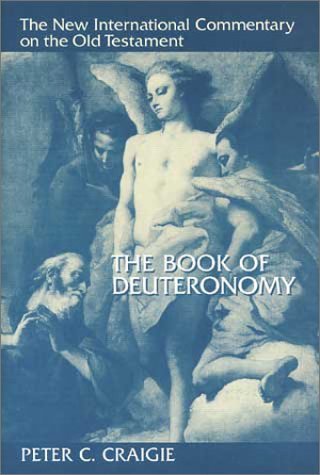
New International Commentary on the Old Testament (NICOT): The Book of Deuteronomy (Craigie 1976)
All of Christianity has been deeply influenced by Deuteronomy (the second giving of the law); this book’s scope and force is absolutely breathtaking when considered from the standpoint of theology. Christ quotes Deuteronomy 6:5 in summarizing “all the law and the prophets.” And when Jesus faces Satan in the wilderness, he quotes exclusively from Deuteronomy. Other Old Testament texts, like Job and Ecclesiastes, wrestle with the blessing/curse theology found in the later chapters of Deuteronomy.
Overall, however, Deuteronomy’s overarching theme is that of covenant—God’s unwavering promise of dedication to His people. In the New Testament, Christ will be the fullest expression of this covenant: proper understanding of this theme will open your eyes to the full beauty of Christ’s sacrifice. This volume seeks to help you understand God’s covenant interaction as clearly as possible, and what it means to “Love the Lord your God with all your heart, all your soul, and all your might.”
Peter Craigie, approaching this from a conservative position, elaborates on and explains this main theme of covenant and thoroughly expounds Deuteronomy as a whole in the New International Commentary: The Book of Deuteronomy.
New International Commentary on the Old Testament - Series Editor: Robert L. Hubbard Jr.
Maneuvering through Levitical laws, bloodshed in Joshua, or Daniel's apocalyptic visions, sincere readers often wonder what the Old Testament means and how it can be the Word of God. For several decades the New International Commentary on the Old Testament has helped countless people traverse this difficult literary terrain.
All the NICOT volumes combine superior scholarship, an evangelical view of Scripture as the Word of God, and concern for the life of faith today. Each volume features an extensive introduction treating the biblical book's authorship, date, purpose, structure, and theology. The author's own translation of the original Hebrew and verse-by-verse commentary follow. The commentary itself carefully balances coverage of technical matters with exposition of the biblical text's theology and implications.






- Adapt your commentary collection month-to-month based on the book or books you are studying.
- Build your commentary library strategically without hundreds of dollars of upfront investment.
- Never get stuck with commentaries you rarely use - swap them out each month as your needs change.



